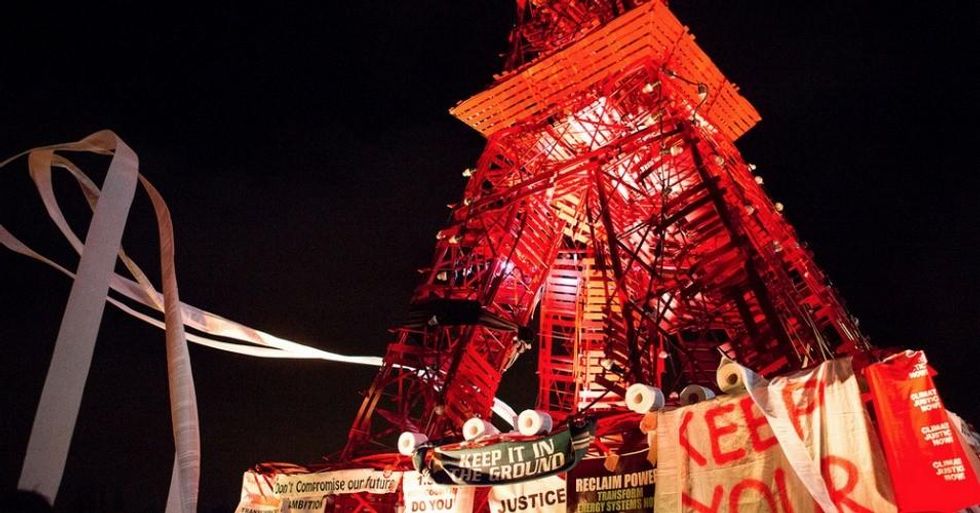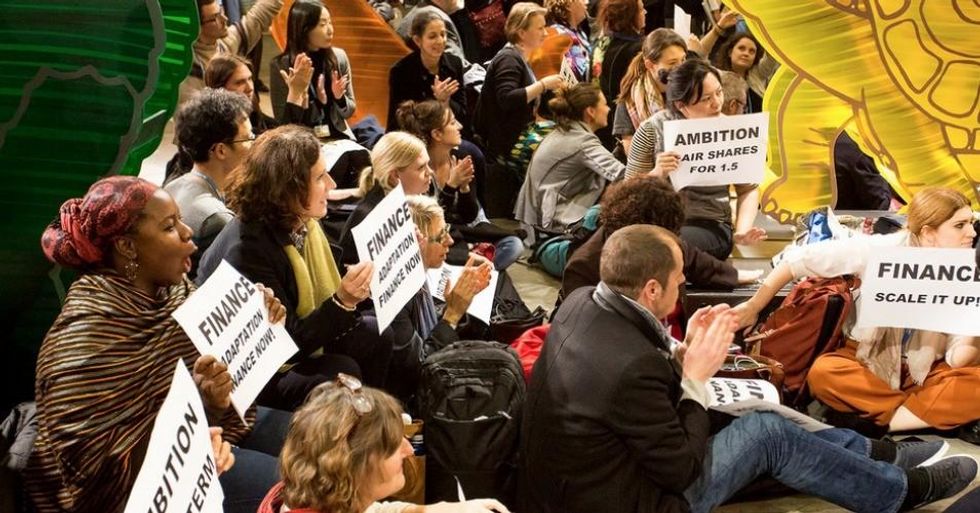Wednesday's release of a weak and vague draft climate deal touched off angry and energetic protests, including a large sit-in at the COP21 summit, where civil society and social movement groups from around the world demanded global leaders take the truly ambitious action necessary to address the climate crisis.
"Our governments must not settle for the draft text as it stands," said Sara Shaw, Friends of the Earth International climate justice and energy coordinator, in a press statement released Wednesday. "People on the frontline of climate change, who are already suffering as a result of climate change, demand that rich countries to do their fair share of emissions reductions and provide necessary finance for an energy transformation in Southern countries. The draft deal fails these frontline communities."
To the disappointment of global campaigners, the 29-page draft deal between representatives of 195 countries leaves numerous key climate demands unaddressed or unresolved. According to news reports and early analyses, the draft:
- Indicates lack of agreement on climate reparations--or financial help in adapting to climate change--from the rich countries that are disproportionately responsible for driving global carbon emissions.
- Does not take a firm position on goals regarding an aggressive move away from fossil fuels extraction, even though scientists warn that the vast majority of fossil fuels must remain in the ground in order to stave off the worst of the climate crisis.
- Omits language regarding fuels used for shipping and aviation.
- Signals support for some market-based "solutions," such as Reducing Emissions from Deforestation and Forest Degradation (REDD+), despite widespread opposition among Indigenous groups and climate justice campaigners.
"Key demands like reparations for those who suffer irreparable losses and damages because of climate change are still highly contested in this draft," said Friends of the Earth International. "There is no agreement on finance. Developed countries are still planning to use a disproportionately large carbon budget, shirking their responsibilities and pushing the burden onto developing countries.'
The draft deal contrasts sharply with the
People's Test on Climate released ahead of the summit by "representatives of Southern social movements of climate-impacted communities and of international faith, labor, development and environmental organizations." These demands include: "urgent and drastic emissions reductions"; "adequate support for transformation"; "justice for impacted people"; and "transformational action" that turns away from carbon markets.
Many who are rallying at the COP21 talks argue that, to truly take on the climate crisis, global societies must undergo a "just transition" away from fossil-fuel-dependent and environmentally-destructive economies altogether.
Some insist that the heavy role of multinational corporations at all levels of the COP21 negotiations is hampering real progress--and thus endangering people and the planet. "If there is a serious commitment to solving the climate crisis, governments would be working with peasants and other small-scale producers, rather than negotiating with corporations," declared the global peasant movement La Via Campesina.
Across the board, climate justice and environmental organizations responded to the latest draft deal with more than a hint of caution.
"Many of the main issues remain unresolved and lots is still up for grabs," Jamie Henn, strategy and communications director for the climate group 350.org told Common Dreams. "Paris is largely a fight to see how closely we can drag politicians towards reality. There's been real progress in seeing them recognize the necessity of the 1.5 degree target, but now we need them to operationalize it."
"Specifically, that means committing to getting off fossil fuels and transitioning to 100% renewable energy by 2050," said Henn. "The parties still haven't coalesced around a long term goal like that, so the issue is very much in play. Paris won't slow the march away from fossil fuels, but it could accelerate it. The clearer the commitments we can get over the next few days, the better. Either way, we'll be heading out with a clear directive: keep fossil fuels in the ground and continue the fight for climate justice."
With just days to go, it remains to be seen what the final deal will entail. "The negotiators are still grappling with major questions, and the theme to all of them is whether civil society or the fossil fuel industry will prevail in the end," Bill Snape, senior counsel to the Center for Biological Diversity and a fellow at American University Law School, told Common Dreams.





